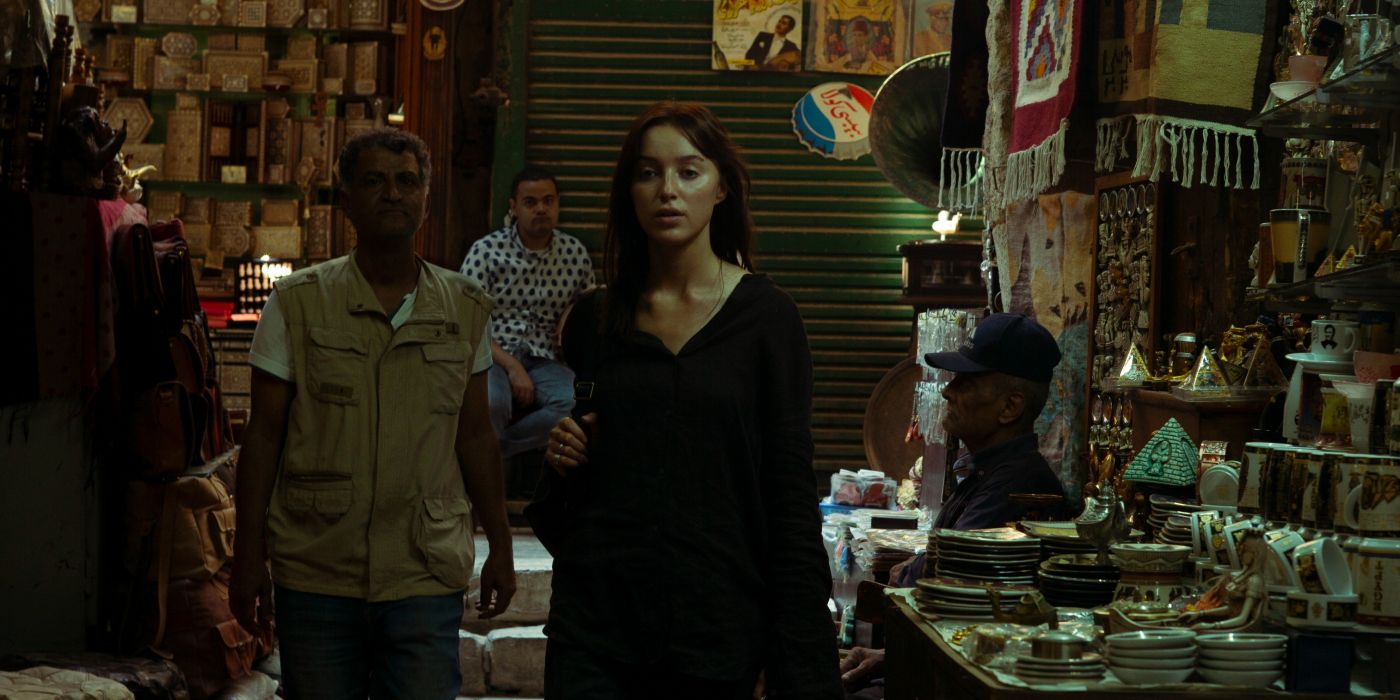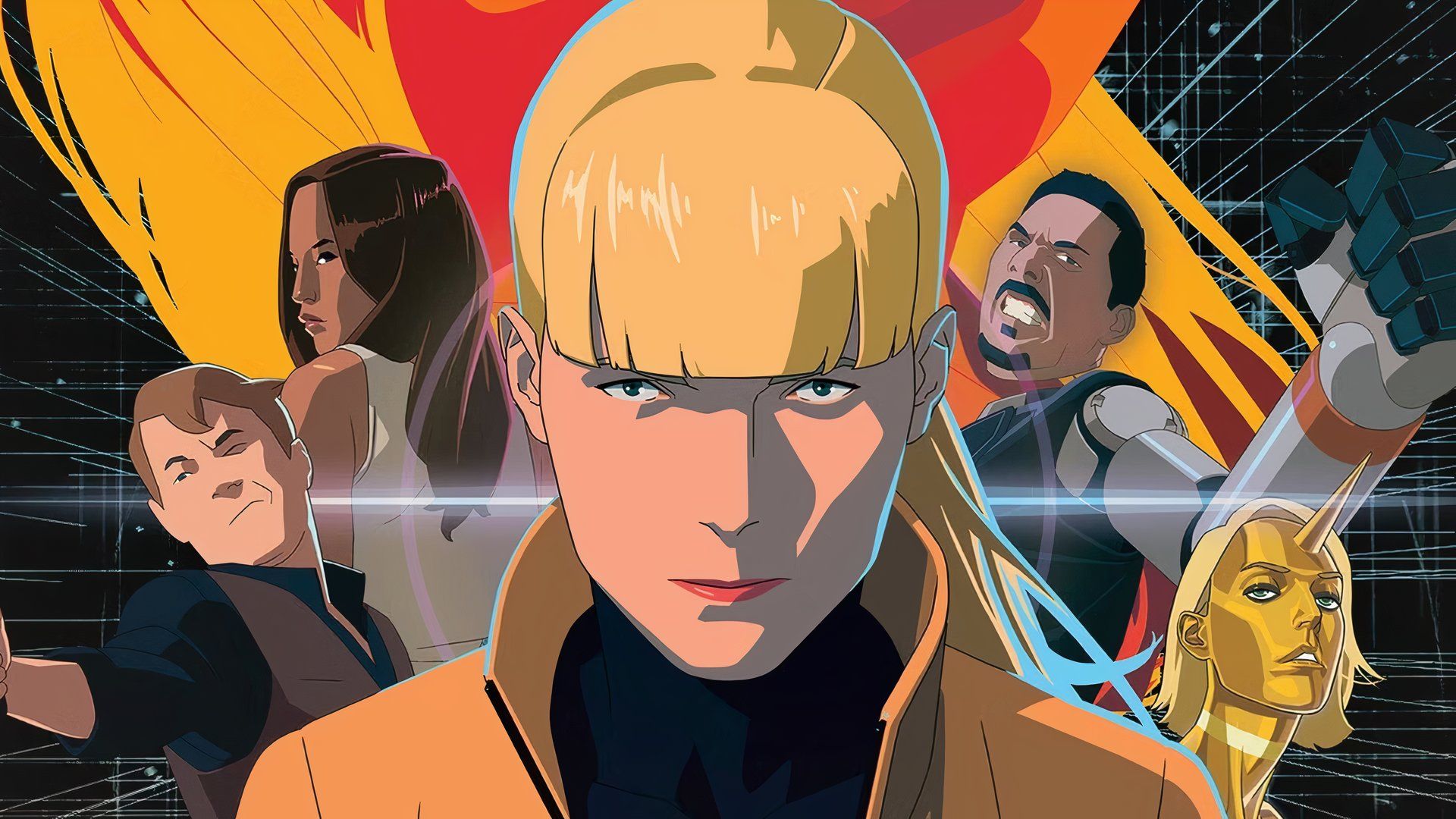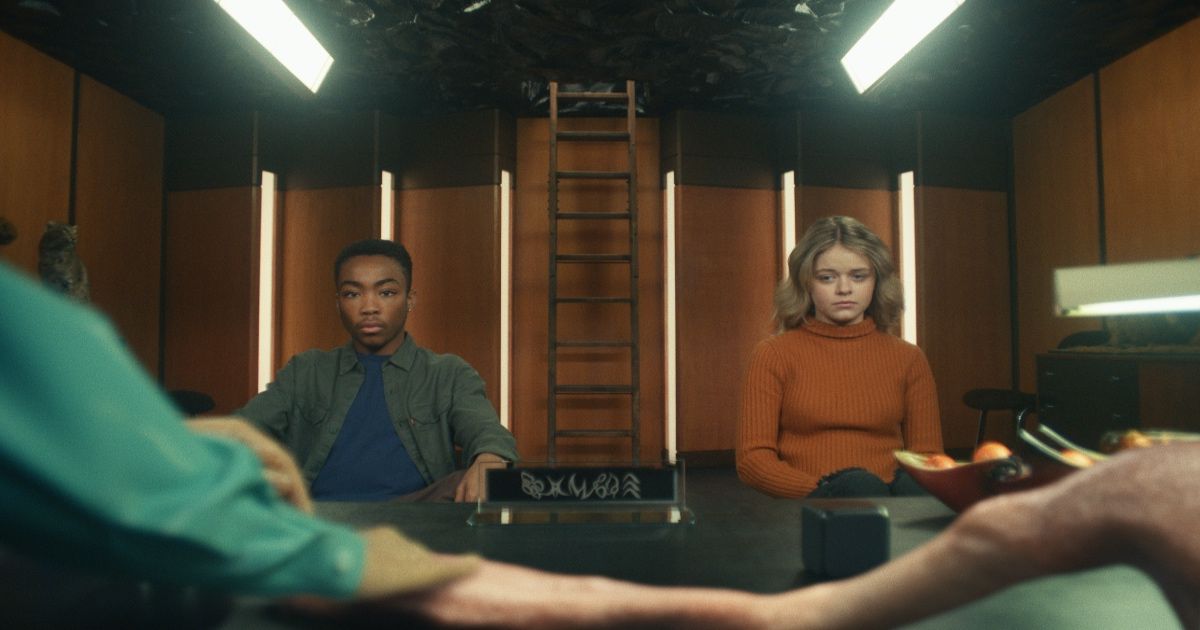After debuting at Cannes and Annecy, the French sci-fi feature Mars Express finally launched in North America on May 3, 2024. Directed by Jérémie Périn and distributed by GKids (who has released other hand-drawn animation films from around the world, such as Studio Ghibli’s The Boy and the Heron), the film takes on an aesthetic somewhere between anime and graphic novel, and a plot evocative of Ghost in the Shell. Aside from these clearly deliberate references, the film’s identity is all its own. There’s a realism in Périn’s digitally hand-drawn characters and, subsequently, the voice acting. This serves to contrast against the computer-generated environments that the characters find themselves in. These contrasts exist everywhere in Mars Express: flesh-and-blood humans and their robot duplicates, high-tech solutions to quotidian human problems, and so on.
This speaks to the film’s intent of exploring the man vs. machine trope at every turn – but in a highly original and stylized way. Certain films of its kind focus on one human’s relationship with a particularly special robot. Through this relationship, humans ultimately learn that they’re not so different. This allows the film to introduce these philosophical questions of free will but never get around to answering them. The world Mars Express introduces us to, on the other hand, is already in the midst of (and in some ways post) this transition.
Still, other films like Mars Express approach their story as a cautionary tale. They tell of a dystopian future where AI entities have violently turned on their creators. Mars Express subverts this approach in a really unexpected way. It all culminates in an audacious climax and a haunting ending.
Mars Express Stars With a Bang
4.5/5
Release Date May 3, 2024
Director Jérémie Périn
Cast Léa Drucker , Mathieu Amalric , Daniel Njo Lobé , Marie Bouvet , Sébastien Chassagne , Marthe Keller , Geneviève Doang , Thomas Roditi
Runtime 1h 25m
Writers Jérémie Périn , Laurent Sarfati
Pros
- The hand-crafted characters are beautiful and stand out against the computer-generated background.
- The voice-acting for the entire cast is phenomenal.
- Mars Express avoids common sci-fi tropes and tells a unique story with a powerful message.
Cons
- Some loose ends remain by the end of the film, possibly leaving the audience wanting a bit more.
The film kicks things off with a police officer knocking on the door of a dorm room at a university on the terraformed Mars. Student Dominique is lounging with a realistically-designed robo-cat, the audience’s first hint that the film takes place in a far-off future. She goes to answer the door, where she is promptly killed. Her dorm mate, Jun (Geneviève Doang), escapes meeting a similar demise by holding her breath underwater in the bath. This leaves the audience wondering what authorities may want with a couple of students.
Related The Best Animated Movie of 2023 Is Finally Coming to Streaming Hayao Miyazaki’s award-winning film, The Boy and the Heron, will stream on Max in the US and on Netflix outside of the US.
For the duration of Mars Express, we follow private investigator Aline (Léa Drucker) and her best friend Carlos (Daniel Njo Lobé), a robot with the likeness, memories, and character of the “real” Carlos, who was killed in action. The two once served alongside their third Musketeer, Chris Royjacker (Mathieu Amalric). Royjacker is now a tech magnate and their employer, sending his two most trusted to investigate cybercrimes and the like.
What Does Royjacker Want in Mars Express?
Recently, Royjacker has been planning to pivot from tech towards an alternative to robots called “organics,” creatures as intelligent as any robot but resembling something more like a brain. This is part of a scheme he’s hatched, which Aline and Carlos eventually catch onto. The idea is to capitalize on a growing sentiment of people who believe that robots should no longer be filling the roles that they do. Some believe it because they think they deserve agency instead; others believe it because they fear an uprising. In any case, organics would serve as suitable replacements as they are super-intelligent but easy to defend against.
Related 20 Scariest Movies About Artificial Intelligence As technology advances further, it makes us wonder about the horrifying implications of artificial intelligence.
Aline and Carlos follow a trail of breadcrumbs left behind on their missions to link Jun’s involvement in the scheme as well as Royjacker’s. The journey takes them on epic chase sequences and various pit stops that serve as world-building for the audience. For instance, at one point, the duo pays a visit to a well-oiled establishment where one may enlist the services of synthetic sex workers. At another, they find themselves at a “brain farm,” a macabre Matrix-like place where rich kids can download the information learned by their poor classmates (like Jun) who donate this “data” for a quick buck.
Humans and Humanoids in Mars Express
Aline and Carlos’ personal struggles remain utterly recognizable despite the novel façade of their civilization. Aline is a recovering alcoholic who has to overcome a sobriety chip in order to have a drink. The chip is nothing more than an extra barrier in the way, something that someone clever enough could (and does) easily sidestep in desperate times. Carlos, on the other hand, has been ousted from his (human self’s) family ever since his ex started seeing someone new. This man antagonizes Carlos, and his determination to paint him out to be the bad guy ends up working to sever Carlos’ relationship with his daughter.
The pangs of sympathy we feel for Aline and Carlos are not in service of a “humans and robots are not so different after all” moral – though that certainly is evident in the case of these two. In fact, it challenges the notion that human beings will ever truly see even the most anthropomorphized robots as fellow people. It seems to suggest that, per our nature, we’re resigned to using even our near-sentient creations for our selfish means. Then, Périn forces us to imagine what AI may “want” in lieu of their condition (hint: it’s not as simple as a takeover plot, like in so many other movies about AI). These themes are present in the motives of Royjacker, the strained relationship between Carlos and his family, and the film’s quietly epic conclusion.
Mars Express finds strength in imagination as well as groundedness. It understands that while humans have an immense creative capacity, we often can’t resolve the most mundane problems of the human condition. That’s where a lot of the film’s sense of humor comes from, as well as its underlying tragedy. While it doesn’t succeed in tying up every loose end (more of a question of overzealousness than carelessness), feeling left wanting more is not totally a bad thing here. In fact, it allows space to mull over all the ideas presented. Mars Express is playing in select American theaters.
You can view the original article HERE.






























